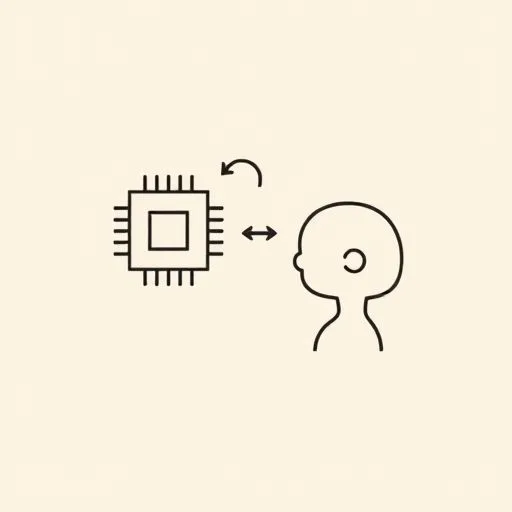
How to Raise Kids Who’ll Thrive in an AI-Driven World?
I was watching my daughter the other day, completely absorbed in building her latest masterpiece—a fantastical structure made from recycled boxes and colorful tape. In that moment, I couldn’t help but wonder what kind of world she’ll step into when she grows up. The job market our parents knew has already transformed dramatically, and you know, AI is already sorting resumes in a blink—imagine having that superpower at your fingertips! The future of work looks almost unrecognizable.
But rather than feeling overwhelmed, I’m actually bursting with excitement! Because here’s the truth: while AI might change how we work, it can’t change the essence of what makes us human. And that’s exactly what we’re nurturing in our little ones every single day through effective AI parenting.
How Is AI Changing the Job Landscape for Our Kids?

You might recall when people stayed at one company their whole career. Now, AI is reshaping hiring faster than ever. And that’s okay—it frees us to focus on what truly matters.
When AI can screen resumes in seconds, analyze skills, and even predict cultural fit, it frees up hiring managers to actually connect with candidates. Think of it like having a super-efficient assistant who handles all the logistical nightmares, so you can focus on the heart of the relationship.
Our kids, growing up in this world, won’t just need technical skills—they’ll need to know how to collaborate with AI systems while bringing their unique human perspective to the table. That’s the sweet spot! That’s where the magic happens! And through mindful parenting in the AI age, we can help them develop these crucial collaborative skills from an early age.
What Skills Beyond Tech Will Our Kids Need in the AI Age?

Let’s be real—my daughter’s generation will likely interact with AI more than any before. But here’s the revolutionary thought I want to share with you: the most valuable skills they’ll develop might actually be the ones that make them uniquely human.
In a world where algorithms can analyze data and predict trends faster than we can blink, I swear, her diplomatic playground moves and wild story plots could win any contest—proof that EQ and creativity are pure gold!
These aren’t just cute childhood quirks—they’re the foundation of future-ready skills! Empathy, adaptability, and critical thinking—these are the superpowers that AI can’t replicate. And here’s the beautiful part: we’re nurturing these every time we encourage our kids to resolve conflicts, express their feelings, or think outside the box.
So while the world buzzes about AI in education, let’s remember that the most advanced “algorithm” we can give our children is a childhood filled with love, curiosity, and the freedom to be beautifully, unapologetically human! When we focus on raising children with AI as a collaborative tool rather than a replacement, we set them up for success in ways we can’t yet fully imagine.
Emotional intelligence, creativity, and ethical judgment will be the golden tickets in an AI-driven world—these are the uniquely human skills that machines can’t replicate.
Why Play-Based Learning Matters Most in the AI Era?

There’s something absolutely magical about watching a child completely lost in play. My daughter will spend hours building elaborate worlds with blocks, creating stories with her stuffed animals, or conducting “experiments” in the kitchen. And you know what? These aren’t just random activities—they’re the foundation of future innovation!
In an AI-driven world, the ability to think creatively, solve problems, and imagine possibilities will be more valuable than ever. Here’s where my hybrid cultural background gives me a unique perspective. Last Saturday, we swapped gochujang into her pancake batter—she loved the kick, and those maple blueberry pancakes afterward made her giggle. That’s our best of both worlds!
We don’t need flashcards or educational apps to prepare our kids for the future (though those can be fun tools too!). Instead, we need to prioritize unstructured playtime where imagination reigns supreme. When kids build with blocks, they’re learning spatial reasoning and engineering concepts. When they create stories, they’re developing narrative skills and emotional intelligence. When they “play office” or “restaurant,” they’re exploring social dynamics and problem-solving.
So let’s champion play! Let’s create spaces where our kids can get messy, make mistakes, and discover the joy of learning through doing. This isn’t just preparation for future jobs—it’s preparation for a life of wonder and discovery! In the context of AI parenting, we must remember that play isn’t just a break from learning—it’s the most authentic form of learning there is.
How Can We Balance Screen Time and Real-World Adventures in AI Parenting?

Can we talk about the elephant in the room? Screen time! As a parent in this digital age, I’m constantly navigating the tricky balance between embracing technology and ensuring my daughter has ample real-world experiences.
Here’s what I’ve discovered: it’s not about choosing between screens and playgrounds—it’s about making both work together harmoniously! When used thoughtfully, technology can be an incredible tool for learning and connection. We’ve explored educational apps that spark her curiosity, video calls that keep her connected with relatives across the globe, and even some family-friendly games that teach strategy and problem-solving.
But here’s my secret sauce: every digital experience is followed by a real-world adventure. After watching a nature documentary, we might go on a “bug hunt” in the local park. After learning about a different country, we’ll try cooking a traditional meal together. It’s all about creating bridges between the virtual and physical worlds, showing our kids that technology enhances rather than replaces real-life experiences.
And you know what? This approach isn’t just preparing them for the digital future—it’s teaching them about balance, discernment, and the importance of being present in the moment. These might just be the most crucial life skills of all! Through purposeful future-proof parenting, we’re not just raising kids who can use technology—we’re raising kids who know when to put it away and fully embrace the world around them.
So tonight, as you tuck them in, ask yourself: what small adventure will you spark tomorrow? That question alone could be their launchpad to a future that even AI can’t predict!
Source: How AI Is Transforming Hiring for Employers and Job Seekers, Rolling Stone, 2025/09/23
